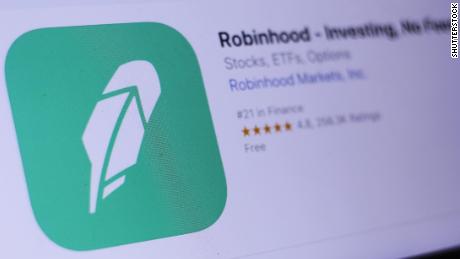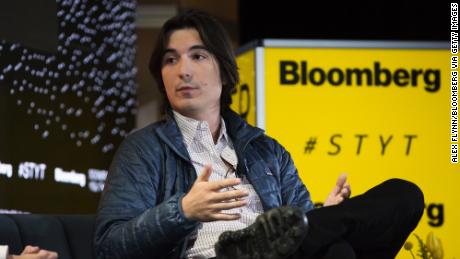Everyday investors have limited access to actively managed funds run by top-tier Wall Street firms. Those sophisticated money managers often require large minimum investments or connections to high-priced financial advisors.
Round, a Los Angeles-based startup founded by a pair of Millennials, told CNN Business it is seeking to solve that problem. The online platform is officially launching to the public this week with a new formula: Round will provide non-accredited investors with access to world-class money managers, including DoubleLine Capital, PIMCO, Gabelli Funds, Cohen & Steers and Guggenheim Partners.
And investors don’t need to break the bank just to get that access. Round is charging a 0.5% advisory fee but promises to waive it if returns are negative. And Round’s investment minimum is only $500, reflecting the platform’s goal of giving young professionals the same investment opportunities as high-net worth individuals and institutional investors.
“Our mission at Round is to help our generation have a better financial future,” Round co-founder Saul Cohen told CNN Business in an exclusive interview.
Round calls itself the only institutional-grade digital-investment consultant for everyday investors.
The startup is relying on technology to disrupt the traditional investing business. Round automates trading, portfolio construction and distribution into a single system. But Cohen stressed that unlike traditional robo-advisers, humans will be making the investment decisions.
“We’re all active — and they’re all passive,” Cohen said of robo-advisers.
The story behind Round
Here’s how it works: Round users must answer questions about their income, financial goals and tolerance for risk. Round’s portfolio construction technology then matches them to a mix of fund managers who invest that capital into stocks, bonds and alternative assets and strategies.
In other words, Round users don’t get to handpick their money managers. And the fund managers, which also include Aberdeen Standard Investments and Highland Capital Management, charge their own fees on top of Round’s. Those additional fees would eat into investors’ returns.
Cohen, 31, quit his job at a portfolio manager at Guggenheim in 2015 to start Round with software engineer Ron Rojany. Cohen was motivated by a sense that access to sophisticated investment advice is uneven.
“I saw firsthand sitting in the investor seat how big institutions and the ultra-wealthy are getting the best people looking after their money — managing their upside as well as the risk,” Cohen said.
Yet Cohen’s friends, even highly educated, high-earning ones, were struggling to afford to buy homes and pay off student debt.
“If I can change the way people do things, I can dramatically improve the life of my generation,” Cohen said.
‘Rich state of mind’
Round quietly started accepting clients in early 2018. Cohen said the startup now has nearly 600 funded investment accounts. It has raised money from investors that include ClickSoftware founder Moshe BenBassat and former PIMCO executive John Brynjolfsson.
Cohen said Round has only spent small amounts of money on marketing as the platform tested its message and built out its technology.
Now, Round is planning to use the money it’s raised to gather assets through a digital ad blitz on Facebook and elsewhere.
“We have carved out a niche as being a premium digital investment offering. Upscale. We will build the brand around that,” Cohen said.
Even though Round’s minimum is only $500, Cohen said the platform is really designed for people who are ready to invest now.
“Round is not for people who are trying to optimize a small amount of savings and are trying to stay afloat. Those people should be paying off their debt, not investing,” Cohen said.
The startup is targeting college-educated Millennials who make north of $100,000 a year and are looking for a sophisticated place to invest. Think: doctors, lawyers and those in finance.
“People who have a rich state of mind, but aren’t rich yet,” Cohen said.
Stock pickers vs. ETFs
Round will face steep competition from well-heeled fintech companies scrambling to get a piece of the Millennial money pie. Some of those firms sport billion-dollar valuations and are backed by major Wall Street firms.
And Round’s emphasis on active management faces an uphill battle. All the momentum today is against expensive stock pickers, in favor of dirt-cheap ETFs. It will be a tough sell to get investors to pay hefty fees charged by top-notch money managers.
Recent history suggests those stock pickers haven’t been worth the cost. In 2018, more than 64% of large-cap equity funds underperformed the S&P 500,
according to S&P Dow Jones Indices. That isn’t a new trend. It was the ninth consecutive year of underperformance, S&P said.
Still, Round is betting that when the bull market in stocks finally ends, investors won’t want robots placing their buy and sell orders.
Nicholas Colas, a former Wall Street analyst, said Round’s business model is a logical step in the evolution of fund management and a smart way to target Millennials.
“It’s a clever way to address that cohort,” said Colas, co-founder of DataTrek Research. “We’ve seen a lot of the basic solutions crop up, like robo-advisers. This seems like the logical next level, the next iteration of the business model.”




























